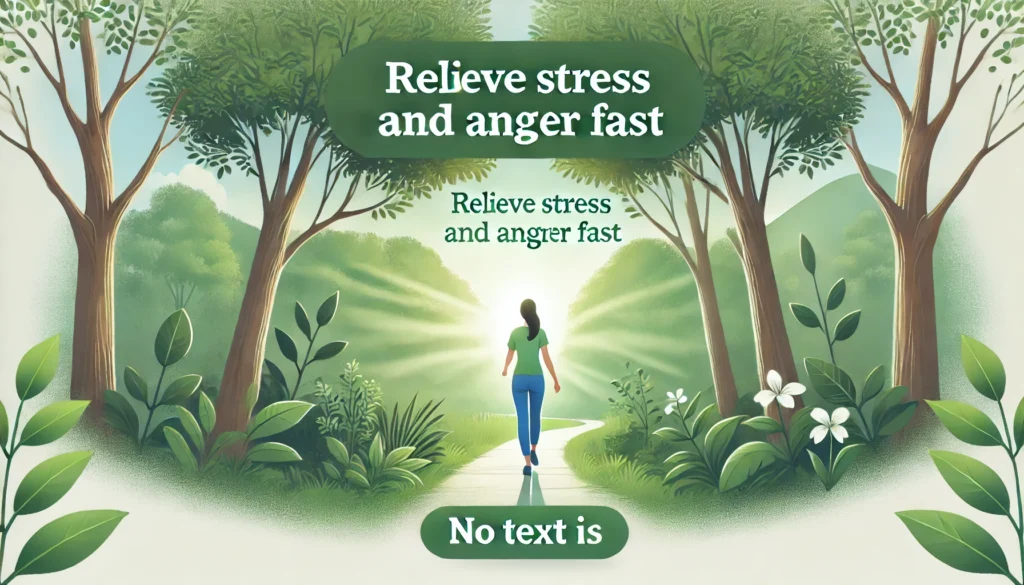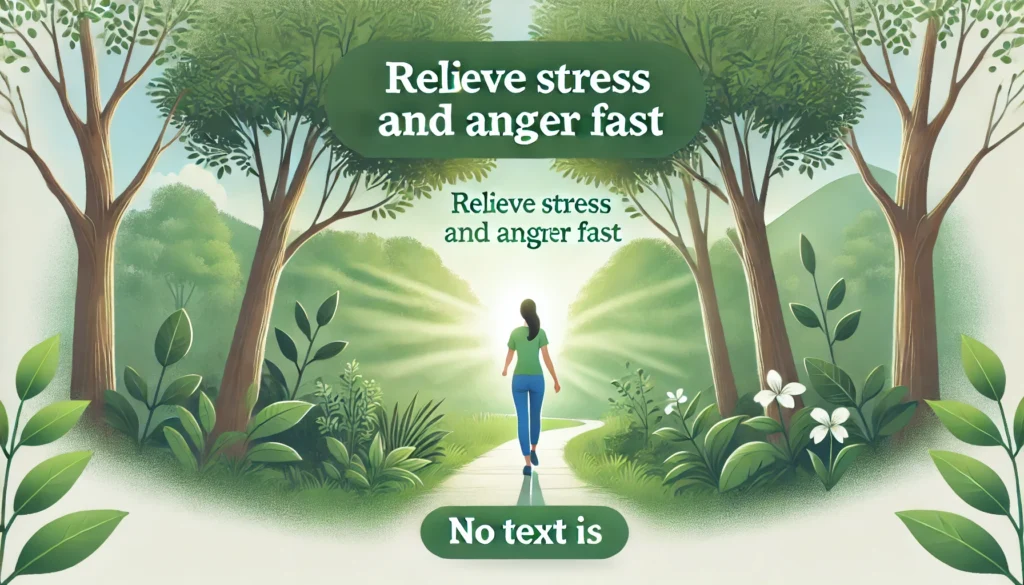Stress is an unavoidable aspect of modern life, often exacerbated by the fast-paced and demanding nature of our daily routines. While some stress can be beneficial, chronic stress may lead to severe health problems, including anxiety, depression, and cardiovascular diseases. Understanding how to effectively manage stress is crucial for maintaining both mental and physical well-being. In this article, we will explore natural stress relief techniques that are accessible and practical, offering you the tools to calm down when mad, remain composed, and release stress and anger effectively.
You may also like: Stress Relief: Sentences to Calm Your Mind
The Science of Stress and Anger
Understanding Stress Response
The human body is equipped with a stress response mechanism, often referred to as the “fight or flight” response. This biological reaction is an evolutionary adaptation designed to protect us from danger. However, in today’s world, this response can be triggered by non-life-threatening situations, leading to chronic stress.
When faced with stress, the body releases hormones such as adrenaline and cortisol. These hormones are essential for immediate response and survival in dangerous situations. However, in the context of everyday life, their prolonged presence can lead to a range of health issues, including weakened immune response and increased blood pressure.
Chronic stress can also impact mental health, contributing to disorders such as anxiety and depression. Understanding how to manage this stress response is key to preventing these negative health outcomes and ensuring a balanced, healthy lifestyle.
Anger and Its Impact
Anger is a natural emotion that can arise from frustration, perceived threats, or injustice. While it is a normal response, unmanaged anger can lead to destructive behavior and stress-related health issues. Learning how to calm down when angry is a critical skill for maintaining interpersonal relationships and personal health.
The physiological effects of anger are similar to stress, with increased heart rate and adrenaline levels. These responses can strain the cardiovascular system and lead to long-term health problems. Additionally, anger can impair judgment and lead to regrettable actions or words.
Developing strategies to manage anger involves recognizing its triggers and implementing techniques to diffuse it before it escalates. This not only enhances personal well-being but also improves social interactions and relationships.
The Interplay Between Stress and Anger
Stress and anger are interrelated, often feeding into each other in a cyclical manner. High levels of stress can lead to increased irritability and a lower threshold for anger. Conversely, frequent bouts of anger can increase overall stress levels, creating a vicious cycle.
Understanding this interplay is crucial for effective stress management. By addressing both emotions simultaneously, individuals can break the cycle and improve their overall emotional health. Recognizing the signs of stress and anger early can allow for timely intervention and prevent escalation.

Techniques for Natural Stress Relief
Mindfulness and Meditation
Mindfulness and meditation are powerful techniques that promote relaxation and stress reduction. By focusing on the present moment and acknowledging thoughts and feelings without judgment, individuals can create a sense of calm and reduce stress.
Benefits of Mindfulness
Mindfulness encourages a deeper connection with the present, reducing the mind’s tendency to dwell on past events or worry about the future. This shift in focus can lead to decreased stress levels and improved emotional regulation. Regular practice enhances self-awareness, allowing individuals to better understand their stressors and emotional triggers.
Guided Meditation Practices
Guided meditation involves listening to a narrator who leads you through the meditation process. This can be particularly helpful for beginners who are not yet comfortable meditating independently. Numerous apps and online resources provide guided sessions tailored to various needs, such as stress relief or improved sleep.
Creating a Mindful Environment
To maximize the benefits of mindfulness, consider creating a dedicated space in your home that encourages relaxation and focus. This area should be free from distractions and filled with calming elements, such as soft lighting, comfortable seating, and soothing scents. A conducive environment can enhance your meditation practice and make it a more enjoyable experience.
Physical Activity
Exercise is a well-known stress reliever. Physical activity increases the production of endorphins, the body’s natural mood lifters, and can help dissipate stress and anger. Whether it’s a brisk walk, a session at the gym, or a yoga class, incorporating physical activity into your routine can significantly enhance your mood and decrease stress levels.
The Role of Endorphins
Endorphins are neurotransmitters released by the brain during physical activity. They act as natural painkillers and mood enhancers, creating a sense of well-being and euphoria. This physiological response can counteract stress, making regular exercise a vital component of any stress management plan.
Exploring Different Exercise Modalities
Diverse exercise options cater to various preferences and needs. Cardiovascular activities like running or cycling elevate heart rate and improve endurance, while strength training builds muscle and enhances physical resilience. Mind-body practices such as yoga and tai chi focus on breathing and movement coordination, promoting mental clarity and relaxation.
Integrating Exercise into Daily Routines
Finding time for exercise can be challenging, but small adjustments can make a big difference. Consider incorporating short bursts of activity throughout your day, such as taking the stairs instead of the elevator or doing a quick workout during breaks. Consistency is key, so aim for regular movement to maintain its stress-reducing benefits.
Deep Breathing Techniques
Deep breathing is a simple yet effective method for calming the nervous system and reducing stress. By slowing down the breath, you can signal the body to relax, counteracting the stress response.
Understanding the Physiology of Breathing
The act of deep breathing engages the parasympathetic nervous system, which promotes relaxation and counteracts the “fight or flight” response. This physiological shift can lead to decreased heart rate, lower blood pressure, and reduced muscle tension, contributing to a sense of calm and well-being.
Structured Breathing Exercises
Practicing structured breathing exercises can enhance your ability to manage stress. Techniques such as the 4-7-8 method or alternate nostril breathing provide specific patterns to follow, making it easier to focus and relax. Regular practice can improve lung capacity and increase mindfulness.
Incorporating Breathing into Daily Life
Deep breathing can be practiced anywhere, making it a versatile tool for stress management. Whether you’re at work, stuck in traffic, or winding down for the night, taking a few minutes to focus on your breath can help reset your mind and body. Consistent practice can lead to long-term benefits in stress reduction and emotional regulation.
Herbal Remedies
Certain herbs have been traditionally used for their calming properties, offering natural stress relief. Herbal teas such as chamomile, lavender, and valerian root can provide soothing effects and help calm the mind.
The History of Herbal Medicine
Herbal remedies have been used for centuries across various cultures to treat a range of ailments, including stress and anxiety. Understanding the historical context of these practices can enhance appreciation for their benefits and encourage mindful consumption.
Preparing and Enjoying Herbal Teas
Preparing herbal teas can be a ritualistic and calming experience in itself. Taking the time to select, steep, and savor your tea can promote mindfulness and relaxation. Experiment with different combinations of herbs to discover what works best for you and your taste preferences.
Safety and Considerations
While herbal remedies are generally safe, it’s important to consider potential interactions with medications or health conditions. Consulting with a healthcare provider before incorporating new herbs into your regimen can ensure safe and effective use. Additionally, sourcing herbs from reputable suppliers can guarantee quality and potency.

Lifestyle Changes for Long-Term Stress Management
Prioritize Sleep
Quality sleep is crucial for stress management. Lack of sleep can exacerbate stress and anger, making it harder to cope with daily challenges. Establishing a regular sleep schedule and creating a restful environment can enhance sleep quality and resilience to stress.
Sleep Hygiene Practices
Establishing good sleep hygiene can significantly improve the quality of your rest. This includes maintaining a consistent sleep schedule, creating a comfortable sleep environment, and avoiding stimulants like caffeine before bedtime. Implementing a relaxing pre-sleep routine, such as reading or taking a warm bath, can signal your body to unwind.
Understanding Sleep Cycles
Understanding the body’s natural sleep cycles can help optimize your rest. The sleep cycle consists of various stages, including light sleep, deep sleep, and REM sleep. Each stage plays a crucial role in physical and mental recovery, so achieving a balance of all stages is important for overall well-being.
The Impact of Technology on Sleep
Excessive screen time before bed can interfere with sleep quality due to blue light exposure, which disrupts melatonin production. Reducing screen time and using blue light filters on devices can minimize this impact. Consider setting digital boundaries, such as a “tech-free” hour before bedtime, to improve sleep quality.
Nutrition and Hydration
A balanced diet and adequate hydration are fundamental for maintaining physical and mental health. Nutrient-rich foods can support the body’s stress response and improve overall well-being.
The Connection Between Diet and Stress
Certain foods can either exacerbate or alleviate stress. Diets high in refined sugars and processed foods can lead to mood swings and increased stress levels, while whole foods rich in vitamins and minerals support mental clarity and emotional stability. Understanding this connection can guide healthier dietary choices.
The Importance of Hydration
Hydration is often overlooked but plays a critical role in stress management. Even mild dehydration can impact mood and cognitive function, making it essential to maintain adequate fluid intake throughout the day. Consuming water-rich foods like fruits and vegetables can also contribute to hydration.
Mindful Eating Practices
Practicing mindful eating encourages awareness of the food you consume and its effects on your body. This involves paying attention to hunger cues, savoring flavors, and appreciating the nutritional value of each meal. Mindful eating can reduce stress-related eating habits and promote a healthier relationship with food.
Social Connections
Building and maintaining strong social connections can provide support during stressful times. Engaging with friends, family, or support groups can offer a sense of belonging and reduce feelings of isolation and stress.
The Role of Community in Stress Management
Strong social ties can buffer against stress by providing emotional support and practical assistance. Engaging in community activities or volunteering can enhance social networks and foster a sense of purpose, contributing to overall well-being.
Strengthening Personal Relationships
Investing time and effort into personal relationships can create a reliable support system. Open communication, active listening, and empathy are key components of healthy relationships that can withstand stress. Regularly reaching out to loved ones can reinforce these bonds and provide mutual support.
The Impact of Social Media
While social media can facilitate connections, it can also contribute to stress and anxiety. Curating a positive online environment by following uplifting content and setting boundaries for social media use can mitigate its negative effects. Engaging in face-to-face interactions can provide more meaningful social support.
Time Management
Effective time management can reduce stress by allowing you to prioritize tasks and allocate time efficiently. By setting realistic goals and breaking tasks into manageable steps, you can reduce overwhelm and increase productivity.
Techniques for Prioritizing Tasks
Prioritization involves identifying tasks based on urgency and importance. Tools like the Eisenhower Box can help categorize tasks and allocate time accordingly. By focusing on high-priority tasks first, you can manage your workload more effectively and reduce stress.
Planning and Organization Strategies
Organizational tools such as planners, to-do lists, and digital apps can assist in managing daily responsibilities. Regularly reviewing and updating your plans can prevent last-minute scrambles and ensure a balanced workload. Incorporating buffer time for unexpected tasks can also reduce stress.
Setting Boundaries and Saying No
Learning to say no is an important aspect of time management and stress reduction. By setting boundaries and declining non-essential commitments, you can protect your time and energy for more important tasks. Communicating assertively and respectfully can reinforce these boundaries and maintain healthy relationships.

Conclusion
Incorporating natural stress relief techniques into your daily routine can empower you to handle life’s challenges with greater ease and resilience. From mindfulness and exercise to herbal remedies and lifestyle changes, there are numerous strategies available to help you calm down when mad, release stress, and lead a balanced life. By understanding and applying these methods, you can enhance your well-being and navigate the complexities of modern life with confidence and composure.
Further Reading:
Relaxation techniques for stress
Important Note: The information contained in this article is for general informational purposes only, and should not be construed as health or medical advice, nor is it intended to diagnose, prevent, treat, or cure any disease or health condition. Before embarking on any diet, fitness regimen, or program of nutritional supplementation, it is advisable to consult your healthcare professional in order to determine its safety and probable efficacy in terms of your individual state of health.
Regarding Nutritional Supplements Or Other Non-Prescription Health Products: If any nutritional supplements or other non-prescription health products are mentioned in the foregoing article, any claims or statements made about them have not been evaluated by the U.S. Food and Drug Administration, and such nutritional supplements or other health products are not intended to diagnose, treat, cure, or prevent any disease.


